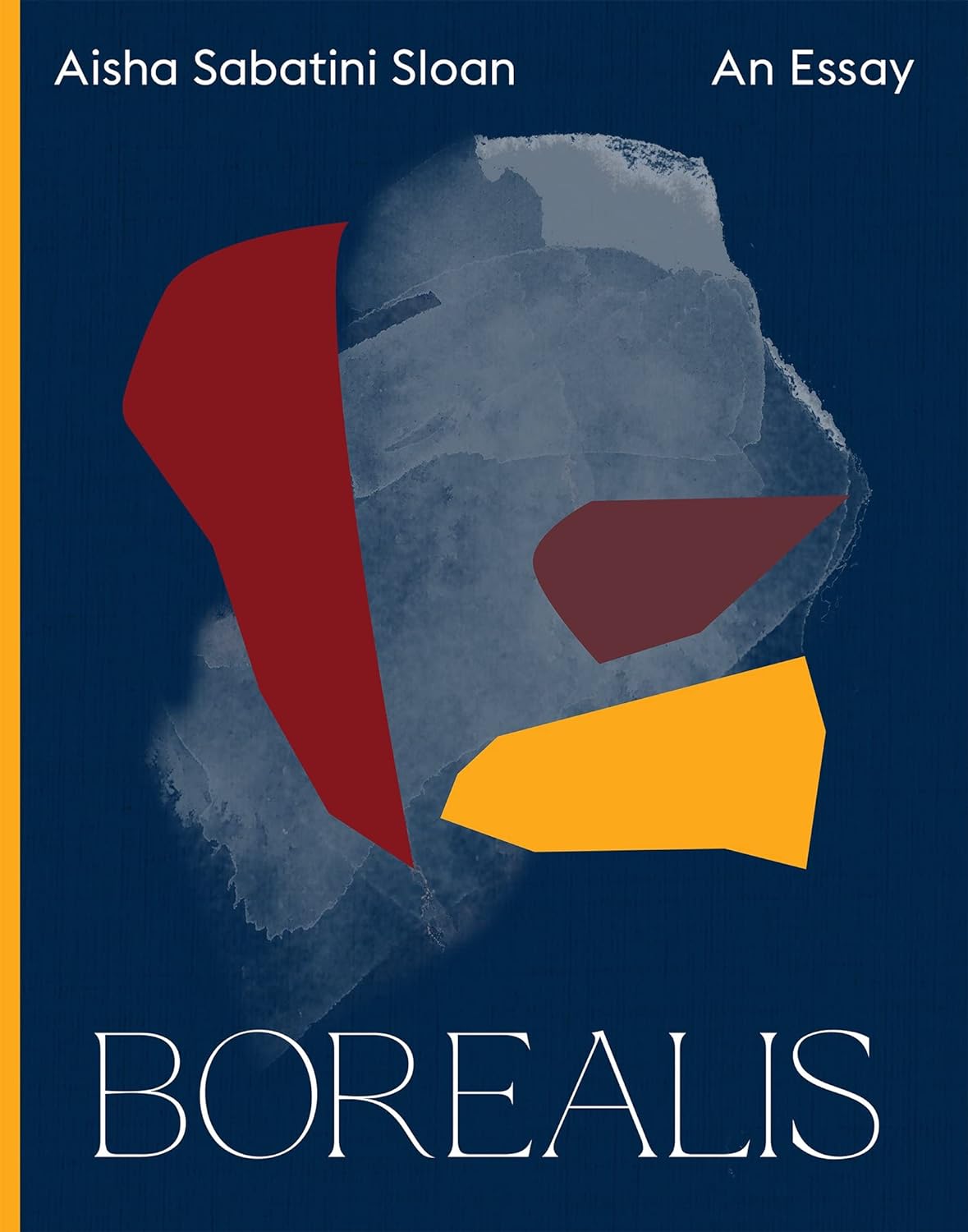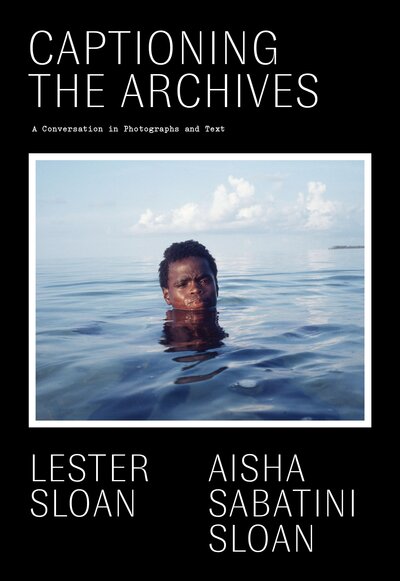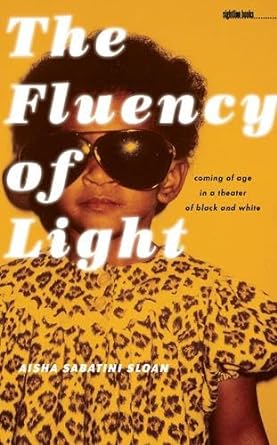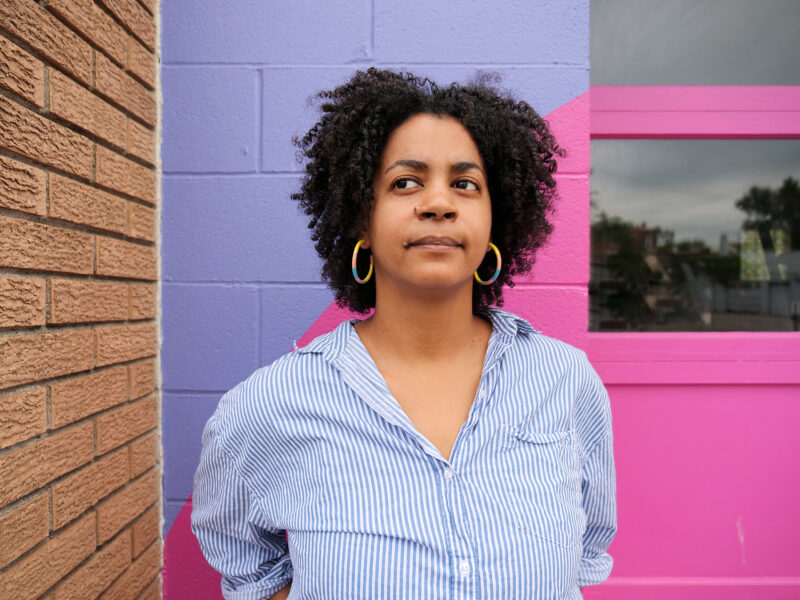

Aisha Sabatini Sloan
Writer, Curator, Artist
Lambda Literary Award
Whiting Award
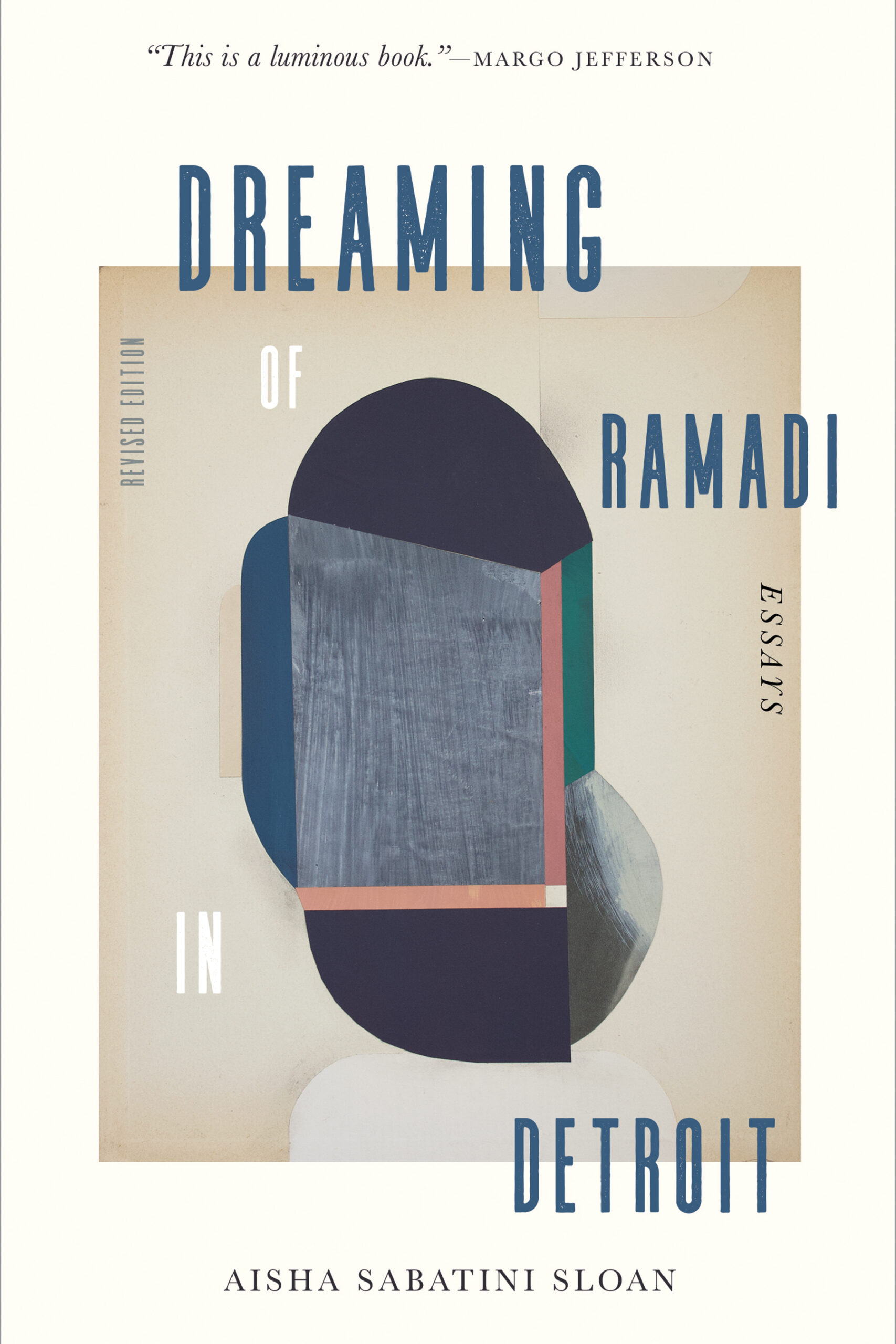
Readings &
Lecture Topics
- An Evening with Aisha Sabatini Sloan
Biography
“Aisha Sabatini Sloan manages to produce a collection of essays that are at once innovative, inspiring, sobering, and absolutely terrifying while daring every other essayist in the country to catch up.” —Kiese Laymon
“Through dexterous collaging of art, literature, correspondence, music, overheards, skylight colors, and intellectual flexes set against a prison’s visiting-room wall, Sabatini Sloan’s writing resists bindings of genre or collective propinquity.” —Samiya Bashir
Aisha Sabatini Sloan writes through the fractured lens of art, film, television, and pop culture. Born and raised in Los Angeles, Sloan is the author of Dreaming of Ramadi in Detroit (Graywolf, 2024), a collection of essays – focusing on the period between the 2016 election and the onset of the pandemic – rooted in the supposition that there is an intrinsic relationship between the way we conceptualize darkness and our collective opportunity for awakening. Of the forthcoming book, Maggie Nelson notes, “I’m so impressed by the critical lucidity of Aisha Sabatini Sloan’s Dreaming of Ramadi in Detroit. Essay by essay, paragraph by paragraph, sometimes even sentence by sentence, Sloan roves, guided by a deliberate, intelligent, associative logic which feels somehow both loose and exact, at times exacting. The implicit and explicit argument of these essays is that there’s no way out but through—and maybe even no way out. So here we are, so lucky to have Sloan as our patient, wry, questing companion and guide.”
Sloan is also the author of The Fluency of Light (University of Iowa Press, 2013); Borealis (Copper Canyon, 2021), winner of the 2022 Lambda Literary Award in Bisexual Nonfiction, the 2022 Jean Córdova Prize for Lesbian/Queer Nonfiction, and the 2018 CLMP Firecracker Award for Creative Nonfiction; and Captioning the Archives (McSweeney‘s, 2021), a collaborative conversation in text and photo between Sloan and her father. About their creative partnership, Rachel Eliza Griffiths noted, “Together, they have formed a powerful reckoning of both power and wonder. Here, you will find both family and imagination suspended in a marvelous sequence of call and response as Lester Sloan and Aisha Sabatini Sloan bring us through a history that belongs to us too.”
Sloan is the winner of the 1913 Open Prose Contest, the National Magazine Award for Columns and Commentary, a National Endowment for the Arts fellowship, and a 2025 Whiting Award. The judges for the Whiting Award noted her as a writer whose collection of cultural criticism “dazzles with startling connections between the personal and the collective. This is the haunting testimony of one who feels herself a born trespasser. Ever alert but fearless, she makes spaces her own.” Her essays can be found in Ecotone, Ninth Letter, Callaloo, Autostraddle, Guernica, The Paris Review, The New York Times, Gulf Coast, The Yale Review, among other places.
She earned an MA in Cultural Studies and Studio Art from the Gallatin School of Individualized Study at NYU, and an MFA in Creative Nonfiction from the University of Arizona. She is an assistant professor of English at the University of Michigan.
Short Bio
Aisha Sabatini Sloan was born and raised in Los Angeles. She earned a BA in English from Carleton College, an MA in Cultural Studies and Studio Art from the Gallatin School of Individualized Study at NYU, and an MFA in Creative Nonfiction from the University of Arizona. She is the author of The Fluency of Light, Dreaming of Ramadi in Detroit, Borealis, and Captioning the Archives. She is the winner of the CLMP Firecracker Award, the 1913 Open Prose Contest, the National Magazine Award for Columns and Commentary, the Jean Córdova prize for Lesbian/Queer Nonfiction, the Lambda Literary Awards for Bisexual Nonfiction, and a National Endowment for the Arts fellowship. Her essays can be found in Ecotone, Ninth Letter, Callaloo, Autostraddle, Guernica, The Paris Review, The New York Times, Gulf Coast, The Yale Review, among other places. She is an assistant professor of English at the University of Michigan.
Visit Author WebsiteVideos
Publications
Dreaming of Ramadi in Detroit
Essay, 2024
This collection of innovative, penetrating, and lively essays features swimming pools and poets, road trips and museums, family dinners and celebrity sightings. In a voice that is at once piercing, mournful, and slyly comic, Aisha Sabatini Sloan inhabits several roles: she is an art enthusiast in Los Angeles during a city-wide manhunt; a daughter on a road trip with her father; a professor playing with puppets in the wilds of Vermont; an interloper on a police ride-along in Detroit; a collector of the dreams of scientists at a biostation. As she watches cell phone video recordings of murder and is haunted in her sleep by the news, she reflects on her formative experiences with aesthetic and spiritual discovery, troubling those places where Blackness has been conflated with death.
Sloan’s lively style is perfectly suited to the way she circles a subject or an idea before cinching it tight. The curiosity that guides each essay, focusing on the period between the 2016 election and the onset of the pandemic, is rooted in the supposition that there is an intrinsic relationship between the way we conceptualize darkness and our collective opportunity for awakening.
Borealis
Essay, 2021
In Borealis, Aisha Sabatini Sloan observes shorelines, mountains, bald eagles, and Black fellow travelers while feeling menaced by the specter of nature writing. She considers the meaning of open spaces versus enclosed ones and maps out the web of queer relationships that connect her to this quaint Alaskan town. Triangulating the landscapes she moves through with glacial backdrops in the work of Black conceptual artists and writers, Sabatini Sloan complicates tropes of Alaska to suggest that the excitement, exploration, and possibility of myth-making can also be twinned by isolation, anxiety, and boredom.
Captioning the Archives
Photograph & Text, 2021
Lester Sloan began his photography career as a cameraman for the CBS affiliate in Detroit, then worked as a staff photographer in Los Angeles for Newsweek magazine for twenty-five years. His daughter, noted essayist and National Magazine Award-winning writer Aisha Sabatini Sloan, covers race and current events, often coupled with analysis of art, film, and pop culture.
In this father-daughter collaboration, Lester opened his archive of street photography, portraits, and news photos, and Aisha interviewed him, creating rich, probing, dialogue-based captions for more than one hundred photographs. Lester’s images encompass celebrity portraits, key news events like Pope John Paul’s visit to Mexico, Black cultural life in Europe, and, with astonishing emotion, the everyday lives of Black folk in Los Angeles and Detroit.
The Fluency of Light
Essay, 2013
In these intertwined essays on art, music, and identity, Aisha Sabatini Sloan, the daughter of African American and Italian American parents, examines the experience of her mixed-race identity. Embracing the far-ranging stimuli of her media-obsessed upbringing, she grasps at news clippings, visual fragments, and lyrics from past and present in order to weave together a world of sense.
Art in all forms guides the author toward understanding concepts like blackness, jazz, mortality, riots, space, time, self, and other without falling prey to the myth that all things must exist within a system of binaries. Recalling her awkward attempts at coolness during her childhood, Sabatini Sloan evokes Thelonious Monk’s stage persona as a metaphor for blackness. Through the conceptual art of Adrian Piper, the author is able to understand what is so quietly menacing about the sharp, clean lines of an art gallery where she works as an assistant. The result is a compelling meditation on identity and representation.
Articles & Audio
Read What’s In Print
• Frozen in Time: On Aisha Sabatini Sloan’s Borealis – Cleveland Review of Books
• How to Watch While Being Watched: Aisha Sabatini Sloan’s Borealis – The Rumpus
• Kismet, Blueprints, & Secret Tattoos: Catching Up with Essayist Aisha Sabatini Sloan – MQR
• An Interview with Aisha Sabatini Sloan and Lester Sloan About Their New Book – McSweeney’s
• The Intersection of Grief and Art: An Interview with Aisha Sabatini Sloan – Sierra Nevada Review
Listen to Audio
• Episode 22: “Form and Formlessness” – The Paris Review
Selected Writings
• Read “On Basquiat, the Black Body, and a Strange Sensation in My Neck” – The Paris Review
• Read “My Father Was a Black Photojournalist When There Were So Few” – New York Times

